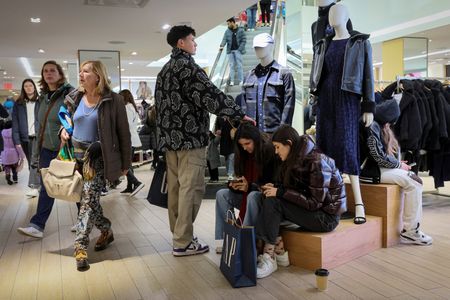(Reuters) – U.S. consumers entered 2023 with the most optimism in nine months, buoyed by healthy incomes and easing inflation even as most worry a recession could trip up the economy this year.
The University of Michigan’s Surveys of Consumers benchmark Consumer Sentiment Index rose nearly 9% to 64.9 in January – the highest since April 2022 – from a final reading of 59.7 in December. The reading was modestly better than the median expectation in a Reuters poll of economists for 64.6, which was also the January preliminary reading from two weeks earlier.
Assessments of current conditions improved sharply, rising by more than 15% to 68.4 this month, also the highest since April. That index has climbed by more than 27% off its record low last June when inflation was raging at a 40-year high, prompting the U.S. Federal Reserve to ratchet up interest rates by the most in a generation last year.
The forward-looking expectations index rose to the highest in a year, but Surveys of Consumers Director Joanne Hsu warned the recent improvements could be jeopardized by the political standoff in Washington over U.S. government borrowing.
Republicans in Congress are determined not to lift the federal government’s statutory borrowing limit without spending cuts that are opposed by the Biden administration, an impasse expected to come to a head later this year.
“Notably, the debt ceiling debate looms ahead and could reverse the gains seen over the last several months; past debt ceiling crises in 2011 and 2013 prompted steep declines in consumer confidence,” Hsu said in a statement.
Meanwhile, consumers’ estimates of near-term inflation fell to the lowest since April 2021 at 3.9% for the next 12 months. Their five-year inflation outlook held steady from December at 2.9%. Both are well down from the elevated levels seen in mid-2022 when consumer prices were rising by more than 9% year over year, their fastest since the 1980s.
Another measure of inflation favored by the Fed fell to the lowest since September 2021 in December at 5%, down from 7% in June. That data out earlier on Friday helped cement expectations for the central bank to dial back the size of its recent rate hikes to a quarter percentage point when policymakers meet in Washington next week.
(Reporting by Dan Burns; editing by Jonathan Oatis)

